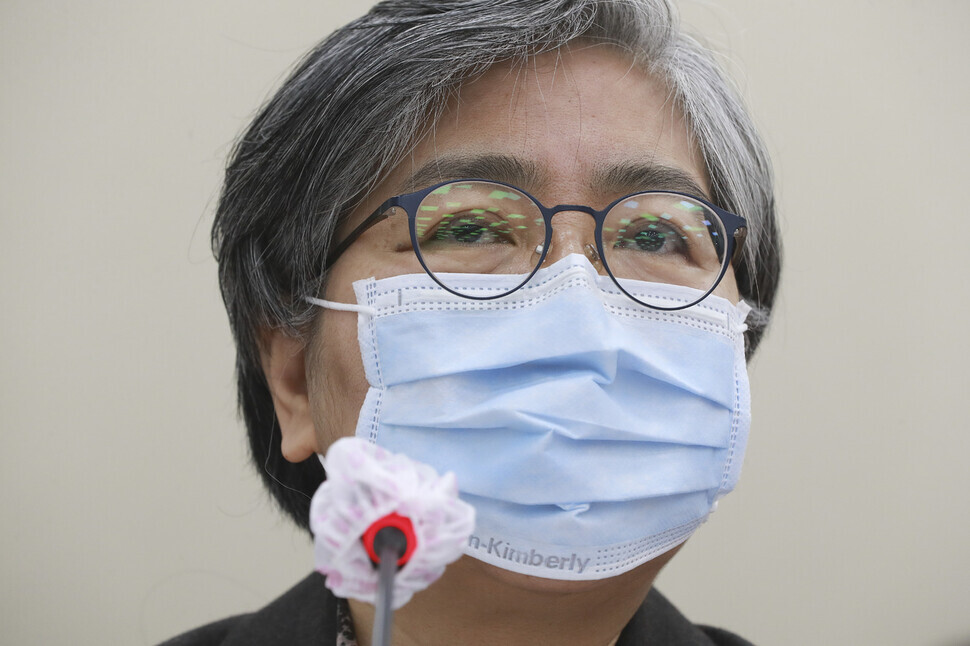hankyoreh
Links to other country sites 다른 나라 사이트 링크
KDCA says no causal link between vaccine and blood clots

A South Korean woman in her 60s whose autopsy showed blood clots is believed to have died of causes unrelated to the COVID-19 vaccine that she received shortly before her death, the South Korean government and experts said.
With no findings to confirm the first suspected case of correlation between vaccination and blood clots in South Korea, the government plans to continue with the vaccinations. Experts voiced their support for the measures, criticizing the current blood clot controversy and vaccine suspension decisions in Europe as “unscientific.”
According to accounts from members of the COVID-19 vaccination implementation team Wednesday, the individual whose autopsy revealed blood clots in a naked-eye examination was a long-term care hospital patient in her 60s who had long suffered from underlying conditions.
The woman in question died on March 6, eight days after receiving the AstraZeneca COVID-19 vaccine on Feb. 26. Prior to her death, the patient showed symptoms of respiratory failure, with physicians attributing the death to related symptoms.
In a meeting last week of the vaccination injury investigation team, heart-related systems were also mentioned as a possible cause of death following experts’ examination of the patient’s medical records. The team plans to pursue an additional evaluation for any irregularities discovered in the official autopsy results.
“Blood clots are a condition that occurs frequently in people’s lives, including those who are of advanced age or have difficulty moving,” said Kim Joong-kon, a Korea Disease Control and Prevention Agency (KDCA) official.
“With so many factors at play, we don’t see any need for people to become alarmed over the vaccine aspect alone,” the official said.
The vaccination implementation team clearly signaled Wednesday that it plans to “proceed with COVID-19 vaccinations according to the original schedule.”
The same day, the World Health Organization and the European Medicines Agency reiterated their position that there was no basis for attributing blood clots to vaccine administration. In South Korea, none of the approximately 570,000 people who have received the AstraZeneca vaccine to date has reported adverse reactions related to blood clots.
At a Wednesday plenary meeting of the National Assembly Health and Welfare Committee, KDCA Commissioner Jung Eun-kyeong, who heads the implementation team, said, “People will be fine receiving the AstraZeneca vaccine.”
“We’re also inoculating KDCA employees [with the vaccine],” she added.
Since March 10, 126 KDCA employees have received the AstraZeneca vaccine, most of them field response staff members. Jung herself has not yet received the vaccine.
The implementation team also announced specific dates for the arrivals of vaccines later this month.
One million doses of Pfizer vaccine — enough for 500,000 people — are scheduled to arrive in March, with doses for 250,000 people arriving on March 24 and doses for another 250,000 people arriving during the last week of the month. Administration of the vaccines to senior citizens aged 75 and older is to begin on April 1.
AstraZeneca vaccine doses for 345,000 people are scheduled to arrive in early April through the COVAX Facility (a global vaccine joint purchasing initiative), with additional doses for 705,000 people to arrive by the end of April.
By Choi Ha-yan, staff reporter
Please direct comments or questions to [english@hani.co.kr]

Editorial・opinion
![[Editorial] Does Yoon think the Korean public is wrong? [Editorial] Does Yoon think the Korean public is wrong?](https://flexible.img.hani.co.kr/flexible/normal/500/300/imgdb/original/2024/0417/8517133419684774.jpg) [Editorial] Does Yoon think the Korean public is wrong?
[Editorial] Does Yoon think the Korean public is wrong?![[Editorial] As it bolsters its alliance with US, Japan must be accountable for past [Editorial] As it bolsters its alliance with US, Japan must be accountable for past](https://flexible.img.hani.co.kr/flexible/normal/500/300/imgdb/original/2024/0417/6817133413968321.jpg) [Editorial] As it bolsters its alliance with US, Japan must be accountable for past
[Editorial] As it bolsters its alliance with US, Japan must be accountable for past- [Guest essay] Amending the Constitution is Yoon’s key to leaving office in public’s good graces
- [Editorial] 10 years on, lessons of Sewol tragedy must never be forgotten
- [Column] A death blow to Korea’s prosecutor politics
- [Correspondent’s column] The US and the end of Japanese pacifism
- [Guest essay] How Korea turned its trainee doctors into monsters
- [Guest essay] As someone who helped forge Seoul-Moscow ties, their status today troubles me
- [Editorial] Koreans sent a loud and clear message to Yoon
- [Column] In Korea’s midterm elections, it’s time for accountability
Most viewed articles
- 1[Column] The clock is ticking for Korea’s first lady
- 2[Editorial] When the choice is kids or career, Korea will never overcome birth rate woes
- 3[Guest essay] How Korea turned its trainee doctors into monsters
- 4[Editorial] As it bolsters its alliance with US, Japan must be accountable for past
- 5S. Korea, Japan reaffirm commitment to strengthening trilateral ties with US
- 6Korea, Japan jointly vow response to FX volatility as currencies tumble
- 7Gangnam murderer says he killed “because women have always ignored me”
- 8Japan officially says compensation of Korean forced laborers isn’t its responsibility
- 9[News analysis] After elections, prosecutorial reform will likely make legislative agenda
- 10‘Right direction’: After judgment day from voters, Yoon shrugs off calls for change